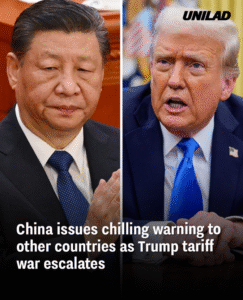As of April 22, 2025, the escalating trade tensions between the United States and China have prompted Beijing to issue stern warnings to other nations. In a letter to Japanese Prime Minister Shigeru Ishiba, Chinese Premier Li Qiang urged Japan to unite with China against U.S. tariff policies, highlighting the need for a collective response to rising protectionism .Reuters
Simultaneously, Chinese Foreign Minister Wang Yi called on the United Kingdom and the European Union to uphold multilateral trade systems in the face of U.S. tariffs. In discussions with UK Foreign Secretary David Lammy and Austrian Foreign Minister Beate Meinl-Reisinger, Wang emphasized the importance of defending international order and promoting an open global economy .Reuters
These diplomatic efforts underscore China’s strategy to rally international support against what it perceives as unilateral and coercive trade practices by the U.S. Beijing has warned that any country entering trade agreements with the U.S. that disadvantage China will face reciprocal countermeasures .ReutersAP News
The trade conflict has intensified, with the U.S. imposing tariffs of up to 145% on Chinese imports, while China has retaliated with 125% tariffs on U.S. goods. This tit-for-tat escalation has disrupted global supply chains and unsettled financial markets .The Guardian+2AP News+2Reuters+2Reuters
In response to these developments, China’s Commerce Ministry has emphasized its commitment to safeguarding national interests and has indicated readiness to take necessary countermeasures against any country that aligns with U.S. policies detrimental to China .The Guardian
These actions reflect China’s broader diplomatic push to counter what it views as economic coercion and to protect its economic interests amid the ongoing trade dispute with the United States.
